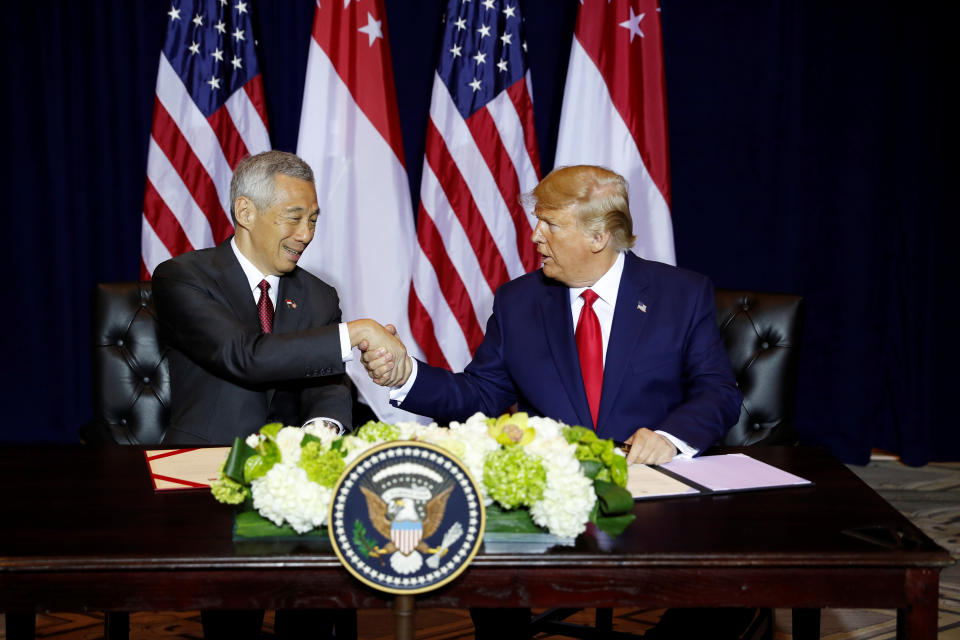Having to pick between US and China would be a 'very painful choice', says PM Lee on CNN

SINGAPORE — Without stable and amicable US-China relations, Asian countries will be pressured to make a “very painful choice” of picking a side with one of the two powers, said Singapore Prime Minister Lee Hsien Loong during an interview broadcast by CNN.
Appearing on the American news channel’s GPS public affairs show on Sunday (6 October), Lee was asked by host Fareed Zakaria what most Asian countries would do if they were asked to choose between the US and China.
“I think they will be very unhappy, because all of your allies, and many of your partners – so you look at Japan, Korea, Philippines, Australia, New Zealand, Thailand – all treaty allies, all of them have China as their biggest trading partner,” said the prime minister.
“So if you ask them to choose and say I therefore must cut off my links with my biggest trading partner, I think you will put them in a very difficult position,” he added, noting that Singapore is a close partner of the US but also has its biggest trading links with China.
Commenting on Singapore’s situation amid the ongoing US-China trade war, Lee said that it presents a “problem for the world”.
“All of us have depended on stable US-China relations, increasingly close US-China economic cooperation, investments, trade, as well as flows of talent and ideas,” he said.
“The way things are going now, that benign trend is being disrupted, and perhaps even turned around. I think that is bad for the world.”
Zakaria’s interview was conducted while Lee was in New York last month, when the latter also met US President Donald Trump.
US ‘not withdrawing’ from Asia
Asked if he thought that the US was withdrawing from Asia, Lee said he did not think so.
“I do not think that is a perception because America is engaging China very, very actively. It is not a happy engagement right now, but it is not pulling out from the field,” he said.
Lee added that the region would like to see the US also actively engage with other Asian countries – in areas such as South-east Asia, East Asia and South Asia – to enable these nations to have economic links with both China and the US.
“If US-China relations are not stable and not amicable, it is much harder for all of us to do that. We will be pressured very hard to choose sides, and it will be a very painful choice,” he said.
Technological divide
Referring to the US government’s imposition of a trade ban against Chinese tech giant Huawei, Zakaria asked Lee if he thought additional similar actions would lead to a technologically divided world.
“It is heading in that direction. If you take this attitude, it cannot stop with Huawei. It says that basically you do not trust them, and you have reason to doubt whether everything can be taken at face value,” said Lee.
“By the same token, they are unable to trust you... So, if you go in this way, you must end up bifurcated on across a wide range of things in terms of technology and systems.,” he added, noting that “(the) rest of us carrying two handphones is the least of our problems”.
On Hong Kong
Speaking about the ongoing anti-government protests in Hong Kong, Lee said he felt “very sorry” for the current situation that China’s Special Administrative Region faces as it is “a city with a lot of talent, enterprise, and potential”.
He noted that China has been a “backstop” for Hong Kong, which enabled the latter to “grow and overcome many economic rough spots”. “But at the same time, they are part of China, and this is a big psychological change, which is not easy for the population to get used to,” said Lee.
He added that Hong Kong also has fundamental issues, such as housing, which need to be tackled.
“Fundamentally, it is a question of hope for the future for the young people. If these are not radically addressed, it is very difficult to overcome the problems,” Lee observed.
Asked if he was surprised that the Chinese government had not used force to shut down the Hong Kong protests, Lee said he did not think so. He said that did not think the Chinese government caused the protests to happen and that they were now confronted with the issue of what to do with the “frog in their hands”.
“(The Chinese government is) uncomfortable, it is a problem. But if (they) do the wrong thing, (they) could make things a lot worse. I think they are very conscious of that,” he said.
“They hope that the Hongkongers can sort it out but the Chief Executive has a very difficult task.”
More Singapore stories:
PMDs may be banned if users' behaviour does not improve, says Janil Puthucheary
Scrapped Yale-NUS course on dissent had partisan 'motives and objectives': Ong Ye Kung


